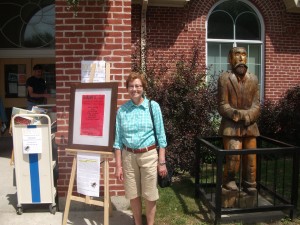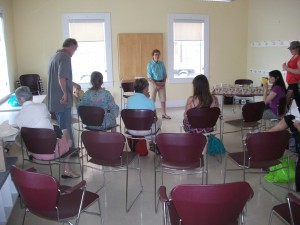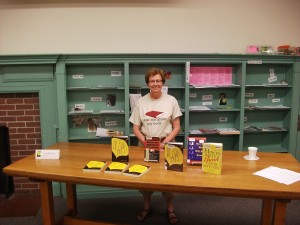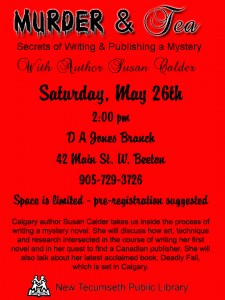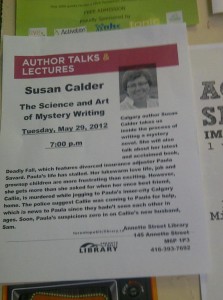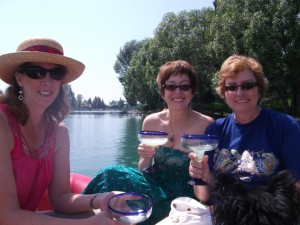The Bloody Words mystery conference got off to a different start for me. Before I left Calgary for Toronto, I received an e-mail from Patricia Gouthro, a professor at Mount Saint Vincent University in Halifax. Patricia asked if she could interview me as part of a research study exploring the connections between lifelong learning, citizenship and the craft of fiction writing. Her hope was that this research would point out the benefits and examine ways of supporting emerging and established Canadian writers.
Patricia noted I would be attending the conference. I assume she got my name from the list of Bloody Words “usual suspects” attendees posted on the Crime Writers of Canada website. Since she would also be at the conference, we agreed to meet Friday morning, before events began. She sent me information about her research as well as questions she would ask. Basically, these related to my writing history, a subject I’ve spoken on a lot this past year.
We met in Patricia’s suite at the Toronto Downtown Hilton, where the Bloody Words conference was held. Patricia taped the interview and said she would send me a transcript later. I gave her permission to quote me by name. However, if I discover I said anything I don’t want attributed to me, I can ask her to quote me anonymously.
The interview took until lunch time. I looked outside the Hilton front doors, saw it was pouring rain and decided to explore Toronto’s underground city. I followed the tunnels to the Eaton Centre and ate at the food court, the site of a shooting the following day. Welcome to life in the big city. And yet, I felt comfortable walking alone through downtown Toronto that night due to all the people out.
After lunch, I attended the conference’s first workshop of the weekend: How to Schmooze Like a Pro. Melodie Campbell gave us tips on using small talk to make others feel comfortable, how to dress for success and table etiquette. One piece of advice I applied right after the session related to business cards recieved: write something distinguishing about the person and the event attended on the back. This avoids the common problem of later looking at a mass of collected cards and thinking, “Who was that?”
The Schmoozing workshop was followed by the Crime Writers of Canada Annual General Meeting. I hadn’t attended their AGM before and found it a good way to put faces to the names of the organization’s movers and shakers. I learned the current membership is 340 people and next year there will be a new Arthur Ellis Awards category, for best crime novella (8,000-12,000 words). I recently drafted a mainstream short story of this length. Is there a way to insert a crime?
Since the rain let up during the AGM, I walked the ten minutes to the apartment I was renting near the Eaton Centre. After some down time, I returned for the Meet and Greet and evening sessions. Through the weekend, there was a choice of three sessions in every hour time slot. My first option was How to Make an E-book. This is virgin territory for me, so I learned a lot. The panelists inspired me to try out the process – some day – by setting up one of my published short stories for sale on Amazon or Smashwords (the two basic systems). They recommended starting with a short story, as a learning tool. With so few reprint markets for my published stories, what do I have to lose?
My panel, called Finally a Bride, followed. Four of us talked to a full room about our experiences of finding a publisher for our first novels and weathering the rejection process. To fit the theme, our table was decorated with paper wedding cakes and bouquets, which we tossed to the audience at the end.
I could have stayed for a third session as well as a play reading that went on into the night, but I didn’t want to tire myself for the next day packed with sessions and an evening banquet. I went back to the apartment for a rest and awoke the next morning, raring to continue.
